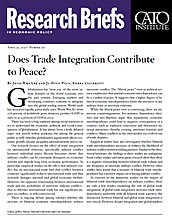Globalization has been one of the most salient features of the world economy over the past century. Emerging markets and developing countries continue to integrate into the global trading system. World trade has increased rapidly, particularly since World War II—from 17.8 percent of worldwide gross domestic product (GDP) in 1960 to 47.4 percent of GDP in 2005.
There has been a long tradition among social scientists to try to understand the economic, political, and social consequences of globalization. It has always been a hotly debated topic—not merely within academia but among the general public as well—whether globalization significantly affects economic growth, income inequality, national identity, and so on.
Our research focuses on the effect of trade integration on international relations, specifically military conflict between individual states. Recent literature shows that military conflict can be extremely disruptive to economic activity and impede long-term economic performance. In particular, empirical studies on the effect that military conflict has on international trade find that conflict between countries significantly reduces international trade and thus seriously damages national and global economic welfare. However, the opposite relationship between international trade and the probability of interstate military conflict— that is, whether international trade has any significant impact on conflict—is still controversial.
There is ongoing debate among scholars whether the increase of bilateral economic interdependence reduces interstate conflict. The “liberal peace” view in political science emphasizes that mutual economic interdependence can be a conduit of peace. It suggests that a higher degree of bilateral economic interdependence limits the incentive to use military force in interstate relations.
While the liberal peace view is convincing, there are numerous counterarguments. For instance, dependency theorists and neo-Marxists argue that asymmetric economic interdependence could lead to negative consequences in a country—such as exploited concession and threatened national autonomy—thereby creating interstate tensions and conflicts. Many conflicts in the mercantilist era evolved out of trade disputes.
Empirical studies have also investigated whether bilateral trade interdependence increases or reduces the likelihood of military conflict between trading partners. Similar to the theoretical literature, the findings of these studies are ambiguous. Some earlier studies and subsequent research show that there is a negative relationship between bilateral trade volume and the frequency of interstate military conflict. However, other studies have found that a measure of bilateral trade interdependence has a positive impact on reducing military conflict.
In contrast to the numerous studies on the impact of bilateral trade interdependence on military conflict, there are only a few studies examining the role of global trade integration. If global trade integration increases trade interdependence uniformly with all bilateral trade partners, the distinction between bilateral and global trade integration is not critical. However, deeper integration into global markets can take place unevenly, lowering trade interdependence with some trading partners. The overall impact of trade integration on interstate conflict is likely to depend not only on the change in bilateral trade interdependence but also on global trade integration.
An increase in global trade openness is expected to reduce the probability of military conflict, as it leads to an increase in the extent of bilateral trade interdependence. However, when the level of bilateral trade interdependence is controlled, the effect of increased global trade openness on the probability of bilateral conflict is not clear. Some research has found that trade openness has a significantly negative impact on the probability of military conflict. This suggests that global trade openness of the dyad can increase the opportunity cost of provoking a bilateral conflict because countries in the global market would prefer to do business with a peaceful partner, and a dyadic conflict can hurt the dyad’s trade with other countries. In contrast, a 2008 study by Philippe Martin, Thierry Mayer, and Mathias Thoenig shows that multilateral trade openness—that is, global trade openness— increases the probability of interstate military conflicts. They argue that countries more open to global trade have a higher probability of conflict because an increase in multilateral trade openness reduces relative bilateral dependence to any given country and thus lowers the opportunity cost of military conflict.
There is little systematic empirical research assessing the peace-promotion effect of both bilateral and global trade integration and how it relates to the geographical characteristics of states. There remains a lack of consensus in these findings. We attempt to fill this gap and produce novel results.
We conduct an empirical assessment of the impact of trade integration on military conflict based on regressions utilizing a panel data set of observations of trade relationships between pairs of countries from 1950 to 2000. The results show that an increase in bilateral trade interdependence and global trade integration significantly promotes peace between countries. The strong positive effect of global trade openness on peace is a novel finding, contrasting the results of Martin, Mayer, and Thoenig. We also find that the impact of trade integration on military conflict varies depending on the geographical proximity between countries. Bilateral trade interdependence promotes peace more significantly for contiguous countries, whereas global trade openness contributes more to peace between distant countries. The results also show that geopolitical factors—such as bilateral distance, joint democracy, relative military capability, UN voting correlation, oil exports, religious similarity, and economic institutions such as free trade agreements and regional trade agreements—influence the probability of military conflict among pairs of states.
NOTE:
This research brief is based on Jong-Wha Lee and Ju Hyun Pyun, “Does Trade Integration Contribute to Peace?,” Review of Developmental Economics 20, no. 1 (2016): 327–44, https://doi.org/10.1111/rode.12222.
About the Authors

This work is licensed under a Creative Commons Attribution-NonCommercial-ShareAlike 4.0 International License.
